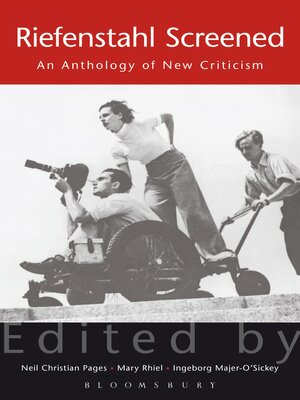
Sign up to save your library
With an OverDrive account, you can save your favorite libraries for at-a-glance information about availability. Find out more about OverDrive accounts.
Find this title in Libby, the library reading app by OverDrive.



Search for a digital library with this title
Title found at these libraries:
| Loading... |
Leni Riefenstahl is larger than life. From the lure of her persona as it enters our homes via television to our pleasure in the recognition of her film images at rock concerts, to her place as part of the history of the Nazi period, Riefenstahl lives on in our imagination and in our cultural productions. Thus, the editors' introduction to this volume examines the manner in which Riefenstahl 'haunts' debates on aesthetics and politics, and how her legacy reverberates in the contemporary cultural scene.
The editors view the collection as a three-part framework. The essays in the opening section of the book show that Riefenstahl is still very much alive and well - and controversial - in popular culture. Her films continue to determine the way in which we think about the Nazi period, providing instantly recognizable images and messages that often go unquestioned. We cannot separate these phenomena from Riefenstahl's years of avid self-fashioning. The second section of the book offers treatments of the shifting, mobile relationship between Riefenstahl's stubborn attempts to create and control her personae and her reactions to others' re-appropriations of the meanings of her life and work. Reading the texts and discourses surrounding 'Riefenstahl,' these scholars treat her memoirs - and her repeated assertions about herself - as a springboard into understanding anew how we might approach her films in a productive way. The closing section of the volume comprises essays that go right to the heart of the matter: Riefenstahl's films and photography. The new contexts-theoretical discussions and emerging discourses that animate these essays-include Scarry's treatise on beauty, justice and the global, the problems of history and memory, the place of Riefenstahl's filmmaking technique in contemporary cinema, and her appropriation of German musical traditions.
Fueled by the work of a diverse range of scholars, then, Riefenstahl Screened offers an opportunity to rethink the place of Leni Riefenstahl and her work in contemporary culture and in academic discourse. It insists upon a critical self-examination that maps a topography of how scholars and teachers avail themselves of Riefenstahl's corpus.
The editors view the collection as a three-part framework. The essays in the opening section of the book show that Riefenstahl is still very much alive and well - and controversial - in popular culture. Her films continue to determine the way in which we think about the Nazi period, providing instantly recognizable images and messages that often go unquestioned. We cannot separate these phenomena from Riefenstahl's years of avid self-fashioning. The second section of the book offers treatments of the shifting, mobile relationship between Riefenstahl's stubborn attempts to create and control her personae and her reactions to others' re-appropriations of the meanings of her life and work. Reading the texts and discourses surrounding 'Riefenstahl,' these scholars treat her memoirs - and her repeated assertions about herself - as a springboard into understanding anew how we might approach her films in a productive way. The closing section of the volume comprises essays that go right to the heart of the matter: Riefenstahl's films and photography. The new contexts-theoretical discussions and emerging discourses that animate these essays-include Scarry's treatise on beauty, justice and the global, the problems of history and memory, the place of Riefenstahl's filmmaking technique in contemporary cinema, and her appropriation of German musical traditions.
Fueled by the work of a diverse range of scholars, then, Riefenstahl Screened offers an opportunity to rethink the place of Leni Riefenstahl and her work in contemporary culture and in academic discourse. It insists upon a critical self-examination that maps a topography of how scholars and teachers avail themselves of Riefenstahl's corpus.






